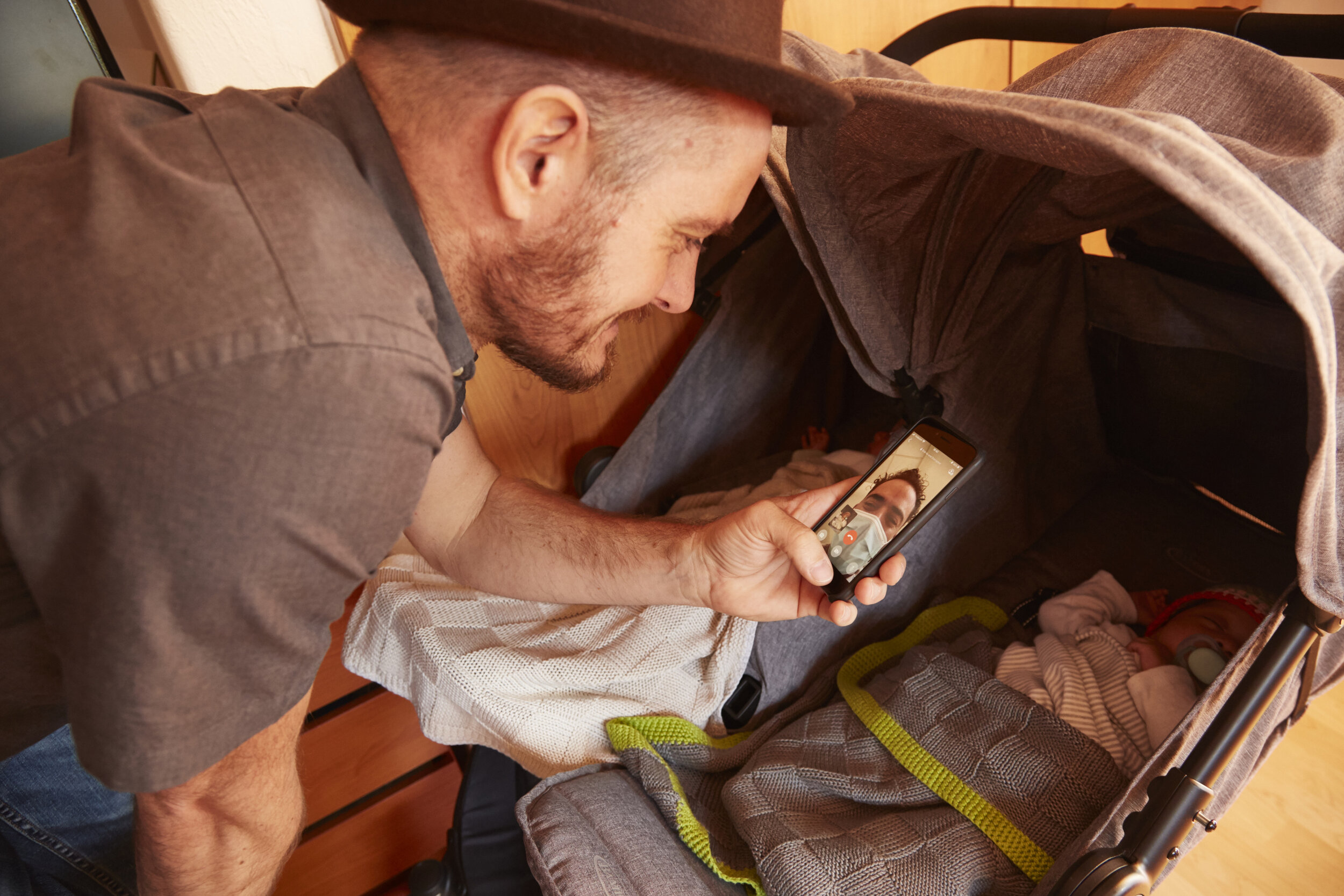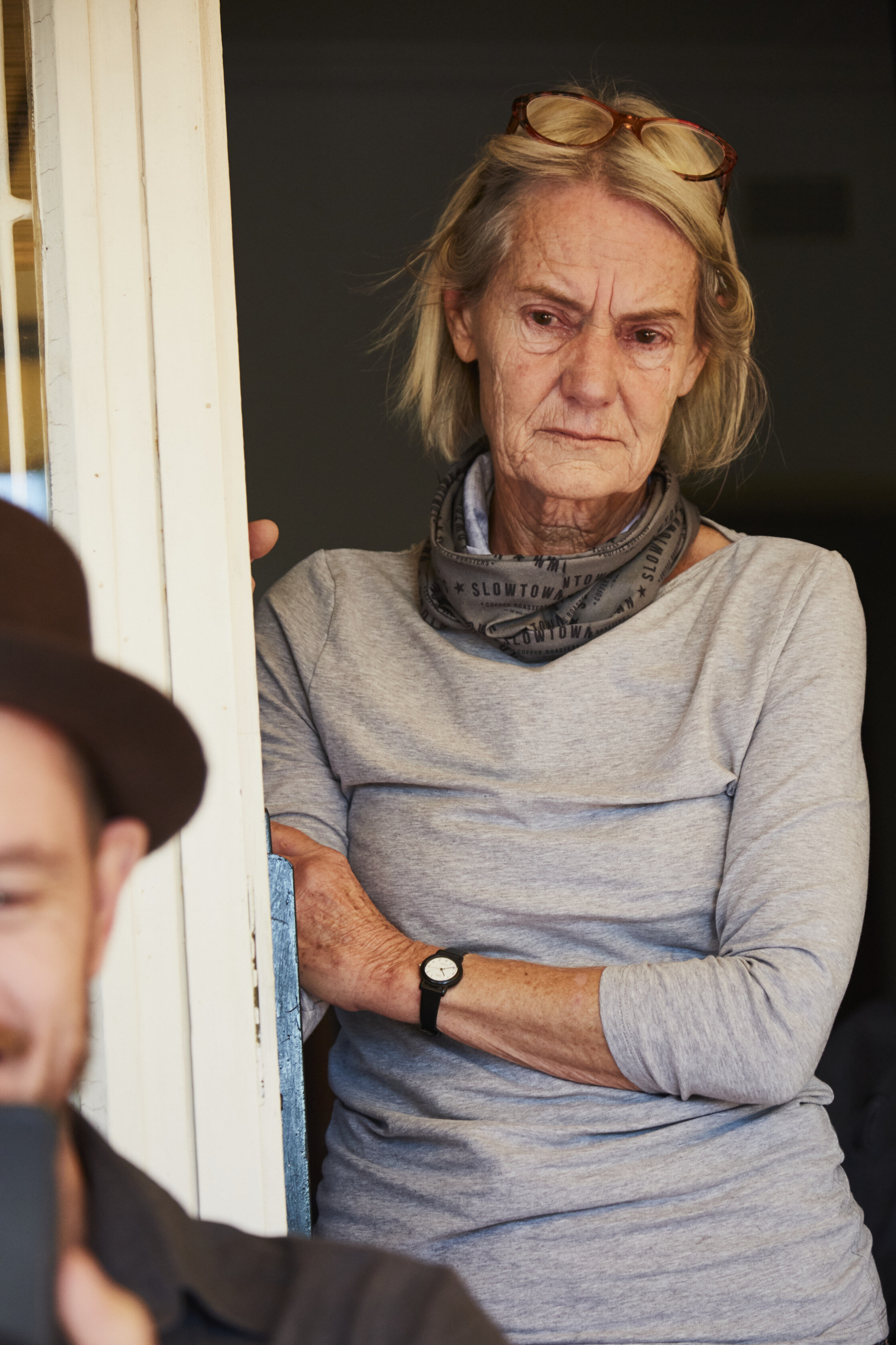Namibian court rejects couple’s appeal to bring their babies home
Words and images for the Mail & Guardian, 9 May 2021.
Phillip holds his daughter soon after hearing that the High Court of Namibia has declined to intercede on the Lühl-Delgado family's behalf, Johannesburg, South Africa. The family are devastated by the result, but there is little time to reflect as the twins need regular feeding and changing.
It’s a sunny morning in Johannesburg and a cautiously optimistic yet tense Phillip Lühl is eating breakfast at a table in a relative’s home. “The waiting is the worst,” he says, barely lifting his eyes from his phone. His sleepy newborns coo from a nearby room. Phillip’s mother, Frauke, is sitting on the balcony anxiously busying herself with knitting, an activity she punctuates occasionally by smoking a cigarette and staring out over the city. Meanwhile in Windhoek, Namibia, Phillip’s husband Guillermo Delgado readies himself for court, where he expects to hear whether the judge will allow his family to come home.
Welcoming a baby is a special moment for any family, most especially for Phillip and Guillermo, a same-sex couple whose newborn twin daughters, Maya and Paula, were born via surrogacy on 13 March. Phillip flew to South Africa, where the twins were born, to be present at the birth and bring them home. Unfortunately, in this case what would usually be a time of excitement and celebration for new parents is politically fraught and painful for Phillip and Guillermo. This is because the couple live in Namibia, where their marriage is not legally recognised, and their three children’s citizenship is up in the air. And so, starting a family has instead been filled with years of bureaucratic battles, court dates, disappointment and yes, waiting …
Phillip and Guillermo’s legal troubles started in 2019, when their first child, Yona, was born, also through surrogacy in South Africa. The Namibian ministry of home affairs refused to grant Yona his citizenship through descent, even though Phillip is a fifth-generation Namibian and Yona’s birth certificate, which was issued by South Africa’s high court, states clearly that Phillip and Guillermo are the sole parents. “That’s when the whole DNA story came up — they say that they require proof of a genetic link between myself and the children,” Phillip tells me between bites of his breakfast.
Namibian authorities have claimed that such a biological link is a prerequisite for citizenship by descent, even though there is no such written law in Namibia’s constitution or Children’s Act. Complicating matters further is the fact that Namibia has no laws surrounding surrogacy. “This is, of course, not a thing heterosexual couples have to deal with. And what about adoption? They keep saying it’s not about our marriage, just that biologically two men cannot have children, hence … here we are,” says Phillip.
In the case of the twins, she reflects that it was heartwarming to see the support on the streets. “There were even people who aren’t a part of the LGBTQ community there. There weren’t even any haters.” She adds that given Namibia’s progress towards equal protections under the law, the time is as right as any to bring these cases forward. While the twins sleep peacefully, the judgment arrives. Denied. The court has rejected their appeal for emergency travel documents. Phillip smiles, jovial in disbelief. His mother’s face drops into her hands.
“That was unexpected,” Phillip says to Guillermo once he manages to get him on the phone. “I was sincerely expecting something more humanitarian,” Guillermo responds. We soon find out that the judge has claimed that the matter is out of the jurisdiction of the high court and that ruling in their favour would be judicial overreach. Phillip is baffled by the verdict: “You mean that upholding human rights is not in the jurisdiction of the court? It doesn’t make sense.” Katjipuka jumps onto the call. “What this means is that the judiciary would be slipping into the realm of the executive,” she explains.
The court has argued that the couple should have applied first to home affairs for the travel documents. “Phillip and Guillermo absolutely did things the right way,” Uno tells me several days later once she has had a chance to read the full judgment. “Because Yona’s citizenship case is still outstanding, they wrote to home affairs informing them of the upcoming birth of the twins. They asked for the travel documents for the twins pending the outcome of Yona’s case.” The response from the minister of home affairs was clear. No.
Phillip and Frauke embrace at the news.
“The argument is disingenuous at best,” Katjipuka adds. The department has refuted any accusations of discrimination or homophobia, claiming that the minister did not issue travel documents based on the fact that their entitlement to citizenship by descent has not yet been determined. “They’re coming up with technicalities,” Phillip explains. “[The decision] continues to paint the picture of utter resistance to any inch of progress on equal rights,” he tells the BBC journalists as they interview him. He’s visibly deflated now that the decision has sunk in. He won’t be returning home in the next few days as he had hoped.
Phillip shows his husband Guillermo their sleeping daughters just moments after finding out that they will not be reuinted soon, Johannesburg, South Africa.
Phillip Lühl’s mother, and grandmother to the twins knits in a family member’s home a few hours before the family is due to hear the ruling from the High Court of Namibia on whether the Lühl-Delgado family can be reunited, Johannesburg, South Africa. The twins, who were born through surrogacy in South Africa, have not been granted travel documents to enter Namibia, where their other father, Guillermo and older brother, Yona, anxiously await their arrival.
The state’s argument regarding a biological link is further undermined by a provision in Namibia’s Child Protection Act, which acknowledges that a heterosexual couple may, in fact, use in vitro fertilisation using double (sperm and egg) donation. As Uno Katjipuka, the family’s lawyer, points out, “in that case, there would be no genetic link for such a couple, and their children would still be granted citizenship.” While their three children do, in fact, have a genetic link to the couple, they refuse to take a DNA test on principle. “We reject the notion that this link makes only one of us the parent,” says Phillip.
The department of home affairs said in a statement on the case that “it was not clear whether one of the parents was indeed Namibian so as to satisfy the requirements of Article 4(1)(2) of the Namibian Constitution which requires a “parent-child link”. Upon reading the constitution, it is not evident that such a link is required. “That is what they claim but that is not what the constitution says. The court will have to interpret the constitution in this regard,” says Katjipuka.
The couple’s son’s citizenship case, the outcome of which will invariably affect the status of Maya and Paula, is due to be heard in August of this year. But, the battle for now is to bring Paula and Maya home to Windhoek where their father and older brother eagerly await their arrival. Since Guillermo does not have permanent residency in Namibia, it was deemed necessary that he and Yona wait in Namibia while Phillip fetched the twins. Guillermo’s residency has been an additional cause of uncertainty for the family. “They resist his every application. His permanent residence was declined, his domicile declined, and even his work visa was declined. It’s a constant struggle,” says Phillip.
Frauke watches Phillip speaking to their lawyer while she takes in the news.
Soon, the journalists leave. A sombre air has befallen their temporary home, as Phil and Frauke continue the loving work of regular nappy changes, quietly warming up bottles of milk, making another pot of coffee. The pair is a practised team by now and each moves seamlessly between rocking and feeding, Zoom calls with family and continued interaction with the media. The busy work seems to be a welcome distraction for Phillip, who struggles to describe how he feels. There doesn’t seem to be time for such reflection. Now it’s on to the next attempt to return home. The couple has made a formal application for the travel documents to Namibian home affairs, as requested by the high court. They await a decision.








